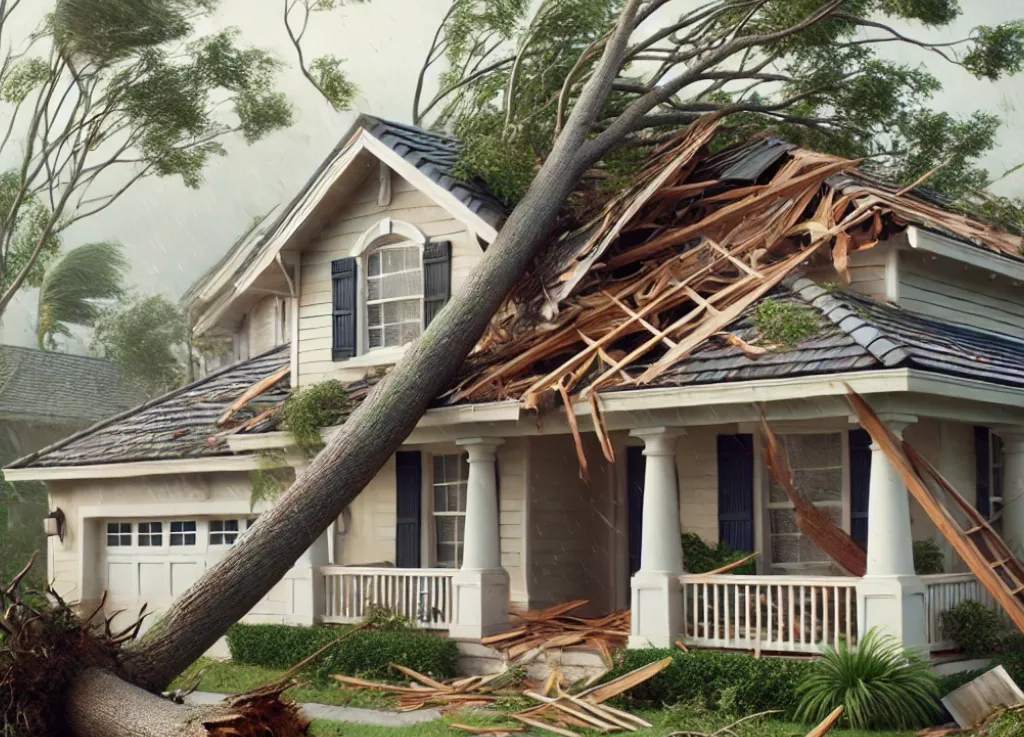In the state of Florida, property owners face substantial exposure to wind damage resulting from hurricanes, tropical storms, and severe weather events. While standard homeowners’ insurance policies ostensibly provide coverage for such damage, policyholders frequently encounter systemic resistance when attempting to secure compensation for legitimate wind damage claims. Insurance carriers routinely employ sophisticated strategies designed to minimize financial exposure through claim denial, underpayment, or unreasonable delays—leaving property owners to bear the financial burden of necessary structural repairs.
Insurance Carrier Denial Strategies
Mischaracterization of Damage Causation
Insurance carriers commonly assert that property damage stems from pre-existing conditions rather than covered storm events. This strategic mischaracterization constitutes one of the primary methods utilized to avoid claim payment.
Common Carrier Assertions:
- Pre-existing Deterioration: Carriers frequently contend that damage resulted from gradual deterioration rather than acute wind events, thereby invoking wear-and-tear exclusions.
- Maintenance Deficiency: Adjusters may assert that inadequate property maintenance created vulnerability to storm damage, providing grounds for claim denial.
Strategic Countermeasures:
- Maintenance Documentation: Maintain comprehensive records of all property maintenance, inspections, and improvements to establish the pre-storm condition of the structure.
- Pre-Hurricane Season Assessment: Secure professional property inspections prior to hurricane season to document the structural integrity of the property before potential storm events.
Causation Disputes
Insurance carriers routinely attribute property damage to non-covered perils rather than acknowledging wind as the proximate cause, thereby leveraging policy exclusions to justify claim denial.
Prevalent Dispute Tactics:
- Flood Determination: Carriers may classify water damage as flood-related (excluded under standard policies) rather than acknowledging wind-driven rain as the causative factor.
- Concurrent Causation: When multiple factors contribute to property damage, carriers often emphasize non-covered causes while minimizing the impact of covered perils.
Protective Measures:
- Legal Representation: Engage qualified insurance litigation counsel to conduct independent causation analysis and challenge improper carrier determinations.
- Immediate Documentation: Compile comprehensive photographic and video evidence immediately following storm events to establish clear temporal and causal connections between the storm and resulting damage.
Policy Limitation and Exclusion Enforcement
Insurance policies contain numerous exclusions and limitations specifically designed to restrict wind damage coverage. These contractual provisions are frequently cited as grounds for claim denial.
Common Coverage Limitations:
- Cosmetic Damage Exclusions: Many policies exclude coverage for superficial damage to exterior surfaces that does not compromise structural integrity.
- Rain Penetration Requirements: Some policies require demonstrable structural breaches (e.g., roof punctures, window breakage) before covering interior water damage from wind-driven precipitation.
Preventative Strategies:
- Policy Analysis: Conduct a comprehensive review of your insurance contract with qualified legal counsel before storm season to identify coverage gaps.
- Policy Enhancement: Consider negotiating coverage extensions or supplemental policies to address identified vulnerabilities in standard coverage.
Procedural Non-Compliance Allegations
Insurance carriers routinely deny claims based on alleged policyholder non-compliance with procedural requirements, particularly regarding claim submission timeframes and mitigation obligations.
Procedural Denial Grounds:
- Filing Delay Assertions: Carriers may deny claims based on alleged reporting delays, asserting that temporal gaps prevented accurate damage assessment.
- Mitigation Failure: Claims may be denied based on allegations that policyholders failed to take reasonable steps to prevent secondary damage following initial storm impact.
Compliance Measures:
- Immediate Notification: Provide formal written notice to your carrier immediately following any storm event with potential damage implications.
- Documented Mitigation: Implement and thoroughly document temporary protective measures, retaining all receipts for materials and services utilized.
Systematic Claim Undervaluation
Even when carriers acknowledge coverage obligations, they commonly employ valuation strategies designed to minimize financial exposure, offering settlements substantially below actual repair costs.
Undervaluation Tactics:
- Depreciation Maximization: Carriers apply aggressive depreciation calculations to reduce replacement cost values, particularly for roofing and exterior components.
- Scope Limitation: Adjusters frequently omit necessary repairs from damage assessments, artificially reducing estimated restoration costs.
Countermeasures:
- Independent Assessment: Retain qualified construction professionals to prepare comprehensive scope and cost documentation for all necessary repairs.
- Legal Consultation: Engage specialized insurance counsel to analyze carrier valuation methodologies and challenge improper calculations.
Insurance Carrier Bad Faith Practices
Florida law imposes a duty of good faith and fair dealing on insurance carriers. Despite these obligations, carriers routinely engage in practices that violate these standards, including unreasonable claim delays, inadequate investigations, and unjustified denials.
Indicators of Bad Faith Conduct:
- Investigation Deficiencies: Carrier fails to conduct thorough claim investigations or disregards relevant evidence.
- Communication Obstruction: Adjuster fails to provide timely claim status updates or adequate explanations for coverage determinations.
- Unreasonable Settlement Positions: Carrier maintains settlement positions unsupported by objective damage assessment or contractual provisions.
Legal Representation: Essential for Claim Success
The inherent asymmetry between insurance carriers with substantial legal and technical resources and individual policyholders creates a fundamentally imbalanced claim environment. Legal representation provides essential expertise to counter this structural disadvantage.
Benefits of Legal Representation:
- Contract Interpretation: Counsel provides authoritative analysis of policy provisions, exclusions, and coverage limitations.
- Strategic Negotiation: Experienced attorneys employ evidence-based negotiation strategies to secure appropriate compensation.
- Litigation Preparation: Documentation is gathered and preserved in a manner that maximizes effectiveness in potential litigation.
- Expert Coordination: Legal counsel secures and manages qualified construction, engineering, and meteorological experts to establish causation and damage valuation.
Securing Your Right to Full Compensation
Wind damage from severe weather events can impose substantial financial burdens on property owners. While insurance coverage should provide financial protection, the reality is that carriers routinely employ sophisticated strategies to minimize claim payments. Understanding these tactics and implementing appropriate countermeasures is essential to securing rightful compensation.
If your wind damage claim has been denied, delayed, or undervalued, contact Malik Law immediately for a comprehensive case evaluation. Our experienced Florida wind damage attorneys possess the specialized knowledge and strategic capabilities necessary to challenge improper claim determinations and secure the full compensation to which you are legally entitled.

